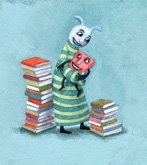
Destined to become a modern classic, Khaled Hosseini's The Kite Runner is half a coming-of-age tale about a young boy looking for his father's acceptance and half a novel about atonement and cultural conflict. As a young boy growing up in Afghanistan in the seventies, Amir is a disappointment to his father. His mother died giving birth to him, and there is a mild undercurrent of resentment on his father's part because of this. Amir is a sensitive and creative lad, scholarly rather than athletic, and pacifist rather than assertive. His one true friend is Hassan, the son of his father's servant. The relationship between Amir and Hassan is deep and complicated; while Amir truly loves Hassan, he is also ashamed to be with him in public because Hassan is illiterate, an ethnic minority, and deformed with a harelip.
The turning point of the novel comes with the region's annual kite fighting competition. In kite fighting, the goal is to fly your kite so that your string cuts your competitor's string, with the last kite flying as the winner. The children act as "kite runners," who go and retrieve the broken kites. Amir enters the competition with Hassan as his runner. When Hassan does not return from running a kite, Amir goes to look for him and finds Hassan being assaulted by several boys in an alley. Rather than fighting for his friend, Amir simply watches unseen. Hassan is ashamed from the assault while Amir is ashamed for doing nothing; as a result, the two drift apart and are eventually separated after Hassan is accused of stealing.
In the second half of the novel, Amir is living in the United States with his father when he gets a phone call from an old friend of his father's in Afghanistan. He tells Amir to return to Afghanistan right away, as he is very sick and needs Amir's help very badly to do something. Amir leaves his wife to go see what his father's friend wants and is told a startling secret. The revelation of this secret drives the plot for the rest of the book, and, while the ending may not be "happy", it is hopeful.
The writing style of the book is supurb and has the feel of a memoir even though it is completely fiction. As I said above, this book will definitely make its way into the English canon because of the many profound themes it contains. The twists are well-plotted and logical, but not obvious. This is one of those books where you think back to what happened earlier and go, "Oh, that's why he said it that way." There's plenty of action to keep readers engaged and aware that the plot is moving. Issues of abandonment and culture are present throughout the book and connect the many plot points.
There are parts of the book that are violent and graphic, but never simply for shock value. If you are a reader of serious fiction, you will not be disappointed by this book. Rating: 4.5/5


2 comments:
This has been on my TBR shelf for a long time and I always seem to choose something else to read instead. Maybe next month I'll pick this up. Thanks for the review. :)
You're welcome! It was the same for me - luckily, I had this group as a good excuse and deadline to get it read :)
Post a Comment